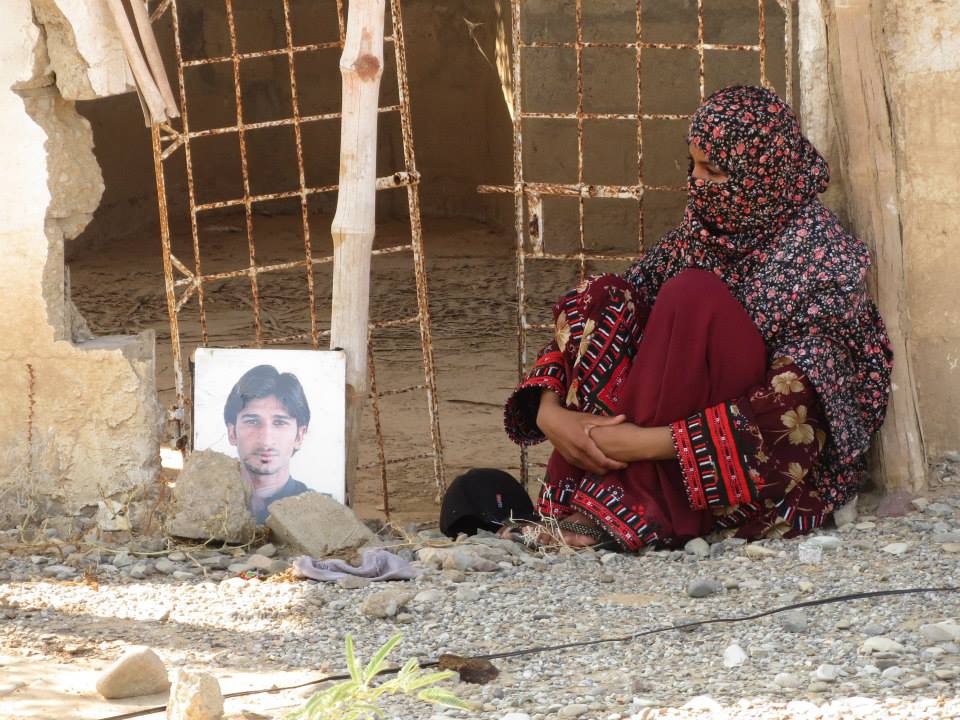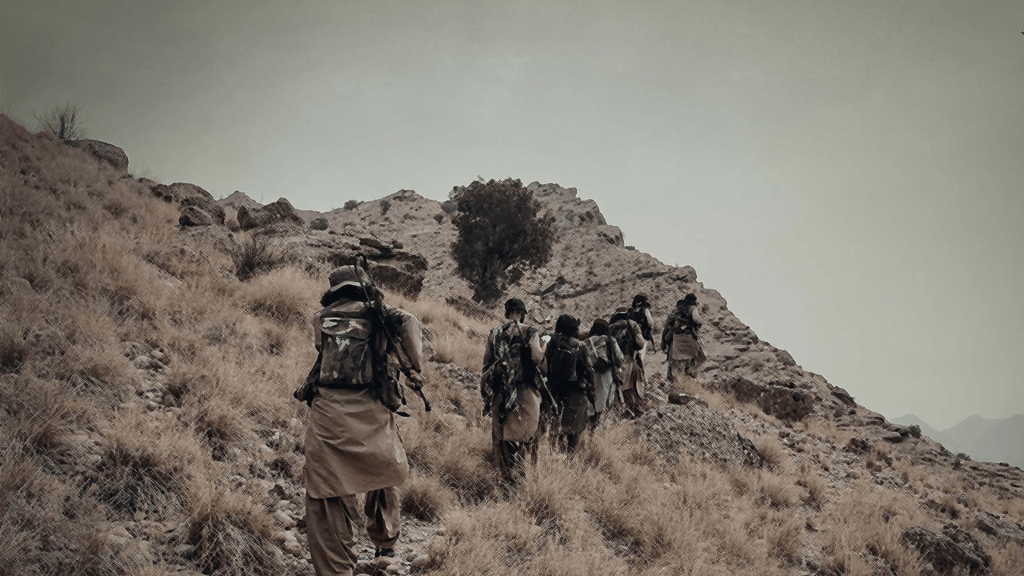On the outskirts of Quetta, just at the foothill of the Chiltan Mountain range, is a small town comprising over 10,000 people. The town was established by the internally displaced refugees from Balochistan’s Kahan town who had been forced to flee their ancestral land in the 1970s during the conflict between Pakistan military and Baloch insurgents.
This new town has retained the old name Kahan, with the English word “New” prefixed to it, as a solemn reminder to their abondoned homeland.
Officially, however, New Kahan does not exist. Thus it has no electricity transmission lines, no water supply, no schools and no health centers.
Like the name, its residents have also inherited the evil of enforced disappearances from their past, albeit its forcibly disappeared people have no address.
On one side of the town are rows of gravestones numbering to hundreds, scribbled with the names of those buried underneath. This graveyard, known as Shuhda Kabrestan, or Martyrs’ Graveyard, has also some unnamed graves, a stark resemblance with the Tyne Cot war graves, except, there is no official record of this graveyard. Nor is there any record of the bodies burried in these graves. These are the bodies of people initially enforced disappeared, and then returned as dead to find their resting place here.
Unlike the Tyne Cot graveyard which has one woman buried there, there are no female names of martyrs on the gravestones in New Kahan.
I first heard about New Kahan in the times of relative peace, in 2003, from an old man who had been deeply brutalized by the war in the previous decades.
He was a shepherd from Kahan. Let’s call him Uncle Rahim. Now in Quetta, he served as a security guard at various pharmacies and grocery shops situated near our student dormitory. The first time I saw him, I mistook him for a drug addict, but soon we made acquaintance.
As is customary in the Baloch society to inquire about one´s health on an econcounter, I out of this custom asked him about his health one night. He began to complain about his old age and the long, early-morning cycle rides uphill on the dirt roads back to his home in New Kahan after his night duty.
He further explained that there were no bus trips to New Kahan, and his young children seldom visited the city centre. I was astonished by the fact that he was feeding three children in this old age when his children should have been taking care of him. This divergence from normal life forced me to ask him why did he not have children in his younger years?
“I had four children,” he replied emotionlessly.
Expecting a broken marriage story, I asked him what happened to those children.
“They were taken away by the army when we were still in Kahan,” he was still as cold as ice.
And his wife?
“She was also taken away.”
Why he did not stop them?
“I did. They shot at me and I was hit by six bullets.”
Staring direct into my face as if he wanted to catch my eyes, he slipped up his long baggy Kamees and showed me half a dozen bullet wounds on his stomach. He was trying to prove to me that he was not a coward, and that he had fought to save his family.
The rest of his story is not less fantastical. With six bullets lodged in his stomach and a chaddar wrapped around his wounds, his fellow Marri tribesmen transported him from Kahan to Afghanistan on their shoulders.
Once his wounds were healed, he began a new life along with thousands of other Baloch refugees in Kabul. He never heard again about his wife and children.
As he explained, he himself was not an insurgent. He had rather been punished because other militants had once visited his hut.
His story was tragic, but not easily believable. At least I did not believe it until 2005 when I myself became a forcibly disappeared person.
He came back to Balochistan along with other Marri tribesmen when their tribal chief negotiated a deal of return with the Pakistan government in the 1990s. He married again.
Most victims of the 1970s conflict were the rural poor of the Marri and Mengal tribes, except a few city dewellers like Sardar Assad Mengal who was the son of former chief minister Sardar Attaullah Mengal. The cities were mostly unaware about the atrocities happening in the rural areas.
Shepherds, who mostly graze their cattle in the desolated hills of Balochistan, had been the eye of the storm in the conflict between military and the Baloch insurgents.
The insurgents would court them for their support in providing them with cattle as food supplies, and for information about army movement in the area. The palm huts of these shepherds were regular meeting points of guerillas. With their long discussions and stories of previous heroic battles against the army, they tried to boost the public morale and rally the villagers into participation. The insurgent bands would take every opportunity to make the villagers aware of their cooperative power and the necessity of their support in winning the war against what they depict as the brutal and occupying Pakistani army.
On the other hand, the army has its own version of such meetings, which are almost an imitation of those of the insurgents but with an added pinch of brutality and disrespect. The army units surround a village, order all the men in a gathering, and then the intelligence men often accompanied by local informers would interrogate the males caught in the roundup.
The women afraid and abandoned would flock to one of the huts and recite whatever few Quranic verses they have learned from here and there, in the hope that no one is taken away this day. Such an operation would mostly end up whisking one or two suspicious males who become enforced disappeared, a term which locals are not aware of.
In villages which are more cooperative to the army, the operations might end with forced slogans of Pakistan Zindabad (long live Pakistan), and no one being whisked away. Instead, the village chief might receive an invitation to bring the ill and sick of the village to the nearby military camp for treatment. He might also receive an offer to provide information on the insurgtents.
However, this would on no occasion mean that the army´s mistrust for the villagers has vanished; the villagers know it by experience, as previous events suggest that even the informants could be subjected to enforced disappearances.
The latest insurgency, however, is different. It is more widespread. Now, apart from the shepherds of the hills, educated urban people are also visited by the guerrillas. Hence death and fear is not confined to the hills.
Since 2005, repression and fear stalk the streets of Balochistan´s cities. The names etched in the marble gravestones in New Kahan´s martyrs’ graveyard thus are not only of the Marri tribesmen’s from New Kahan, but also of city dwellers of Quetta who were put to death in target killings, and of forcibly disappeared people who were returned as mutilated and tortured bodies.
Particularly after 2009, the army and other secret services killed or kidnapped thousands of people in an attempt to strifle the insurgency which had broiled once again after the dictator Pervaiz Musharraf assumed power in 1999.
Most of the targets were outspoken student leaders, human rights activists, lawyers, poets, writers, and intellectuals. Thousands of them are still missing. It was easier for the army to target the ones who had raised a voice in the cities rather than the risky and burdensome task of following the militants in their mountainous hideouts.
I was reminded of Uncle Rahim and his forcibly disappeared wife when I saw a video of an old man, presumably a shepherd from Mashkay, circulating on social media. The man, whose name is Allah Baksh, alleges that he was forcibly disappeared by the Pakistan army, but then released, and then his cattle were taken away. Just like his cattle, his two daughters and wife were also taken away by the army with the help of a tribal leader, Sardar Ali Haider.
His son was enforced disappeared from Panjgur where he had escaped after the abduction of his sisters and mother. That was the last anyone heard of his family. At some point in the video, he appeals to the government and the army to feel pity on his condition and release his wife and children. At the end, he blames the army of holding his family as bait in order to force him to surrender where he will surely be killed.
The women in Balochistan have always been under pressure for the simple fact of being as women, but not necessarily because they were involved in some kind of political activism. You might remember the incident when tribal leader and Senator Israr Zehri attracted condemnation for defending honor killings. Zehri made it clear that in a society that takes women as a symbol of honor and views their place as being in the home, any woman breaking the social norms would be prone to attacks. In some cases a mere suspicion is enough. The men´s ability to easily control the womenfolk rather eliminates the need for unprejudiced truth.
However, the wives, sisters, mothers and daughters of the disappeared persons have been the most effected. The patriarchal society forces them to experience heightened economic, legal, social, and psychological harms after losing a male family member, who is often perceived as the breadwinner and protector of the family and their honor. The wives of the long time missing persons may even be ostracized by their in-laws for being a financial burden. The remarriage of the dead person´s widows carries a stigma. In recent years, women relatives of the disappeared were also on the front lines of the search for their loved ones, often at great risks of being sexually harassed and abused.
Just last month, reports were circulating in the social media about women relatives of enforced disappeared being offered release of their loved ones in return for sex.
As the decades old insurgency in Balochistan rages, the turf war of nerves between the Baloch insurgents and the army over the hearts and minds of the people continues. Some enforced disappearances of women have even succeeded in forcing their male relatives to have a change of heart and surrender to the Pakistani army. On the other hand, some women have been target-killed by the Baloch militants for being army informants. Whoever might it be, women would remain easy targets to inflict hard blows in Balochistan.



